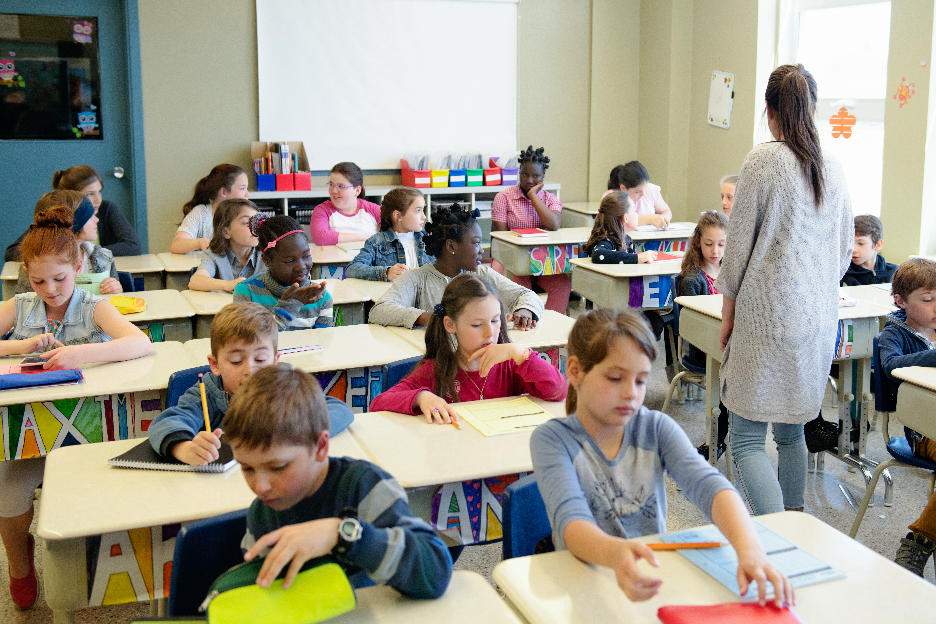“To breathe better, that’s the idea” ... of National Air Quality Day, organised in France on the 14th of October.
A public health issue in many countries, air quality depends on the concentrations of pollutants and in particular on particles and nitrogen oxides linked to the activity of many sectors which pollute the atmosphere (industry, transport, tertiary, agriculture). To take action both indoors and out, Veolia offers a wide range of air quality management solutions: cleaning the air in hospitals, monitoring CO2 and fine particles in schools, preventing allergies to pollen, avoiding unpleasant odours. Examples of practical cases.
Cleaning the air at the University of Montreal Hospital Centre (CHUM)
Nosocomial infections acquired in hospitals remain a critical health issue. 30% of them are respiratory infections. Veolia, the CHUM, and the University of Laval have worked in partnership to develop a methodology for monitoring the microbial quality of indoor air in ventilation ducts. This methodology and the associated monitoring parameters have been the subject of scientific publications. With the IAQ HOSPITALS solution designed in Canada, Veolia completes its range of Air Control solutions for hospitals and thus reduces the risk of airborne transmission of nosocomial infections.
Monitoring CO2 and fine particles in schools
In France near Lyon, the city of Meyzieu has chosen Veolia to equip the refectories of 8 schools and 2 nurseries with CO2 sensors to limit the risk of aerosol transmission of the coronavirus. Indicator lights alert the school staff, in real time, of the need to ventilate these spaces.
This AIR Control COVID solution responds to government recommendations for monitoring CO2 in establishments welcoming young children. The city's technical teams have a dashboard to monitor all the sensors. This solution actively participates in reducing the risk of the virus spreading.

Since 2019 in Raincy in the Greater Paris region, two schools counting a total of 600 students have been equipped with air treatment units to guarantee good quality indoor air. Indeed, the quality of indoor air is an important issue for the health of schoolchildren: given that their respiratory system has not reached maturity, they are more vulnerable to pollution. Poor air quality also affects their learning abilities. Veolia gets rid of the sources of exterior pollution by filtering the air distributed inside the buildings, and applying its air treatment technologies designed for hospitals or clean rooms in schools. Sensors have also been installed to take real time measurements of temperature, humidity, CO2, volatile organic compounds and fine particles. They allow the installations to be optimised and the data to be gathered in a dashboard which attests to the results obtained. The Group also provides teachers and children with educational tools so that they can be proactive in terms of the quality of the air they breathe inside schools.
Preventing pollen allergies
In France, a quarter of the population is allergic to pollen. Within 30 years, 50% will be affected. Given that pollen emissions in the air cannot be controlled, reducing the risk of exposure of the population depends on rapid, local and reliable measurement of the amount of pollen in the air, in order to alert people with allergies. Veolia, in partnership with Lify Air, has set up a control system with 4 measuring stations in the metropolis of Lille. The start-up Lify Air provides the sensors and analyses the data in real time. They are then summarised on a dashboard. From spring 2022, it will be possible to monitor the different pollens present in the air of the metropolis in real time to allow people with allergies to adapt their behaviour and their medical treatment.

Avoiding bad smells
In Spain and France, Veolia is developing a solution for monitoring and modelling odours to help its customers overcome their problems of odour nuisance. Alongside .numtech, a French SME specialising in the development of infrastructure management systems based on their impact on air quality and odours, Veolia offers to visualise and model, in real time or in forecast mode, the odour nuisance of an industrial facility. This solution is deployed on the Nîmes West wastewater treatment plant, where 20 sensors measure air pollution and odours and monitor concentrations by visualisation and modelling, while meeting regulations on pollutant emissions.
An equivalent system has been deployed in Spain on the wastewater treatment plant of a paper manufacturer. With this solution, Veolia's teams are able to prevent odorous episodes and preserve the quality of life of local residents.
Evaluate, act and support”, this is the approach proposed by Veolia to sustainably improve air quality. Whether the pollution concerns odours, pollen, CO2 or another substance, the first challenge is to render the pollution levels visible and quantify them. That makes it possible to implement remedial solutions and guarantee good air quality over time. In addition, the involvement of stakeholders makes it possible to take into account their feelings and involve them in the action plan over time", explains Frédéric Bouvier, Director of Veolia's Air Expertise Cluster.

Sensors and air purifiers
Every week, in France, Veolia deploys its solutions for monitoring and guaranteeing good indoor air quality (sensors, purifiers or air treatment units), for example in a vocational training centre, a regional administration, a dental prosthesis practice, nursing homes, schools, offices, or a place of worship.
A global public health issue
Causing more than 7 million premature deaths worldwide per year (WHO figures 2018), air pollution is the fourth risk factor for death in the world. Indoor air is often more polluted than outdoor air, and yet we spend 80% of our existence inside buildings. According to the Observatory of indoor air quality in schools in France: in 2021, 100% of classes have concentrations of fine particles above the WHO standard; 41% of schools have at least one class that is too confined; and 15 to 20% of the classes have benzene and formaldehyde concentrations above the standard.
For more information
> Veolia Lify Air and .numtech will be present at the Pollutec fair in Lyon from 12-15 October 2021.


